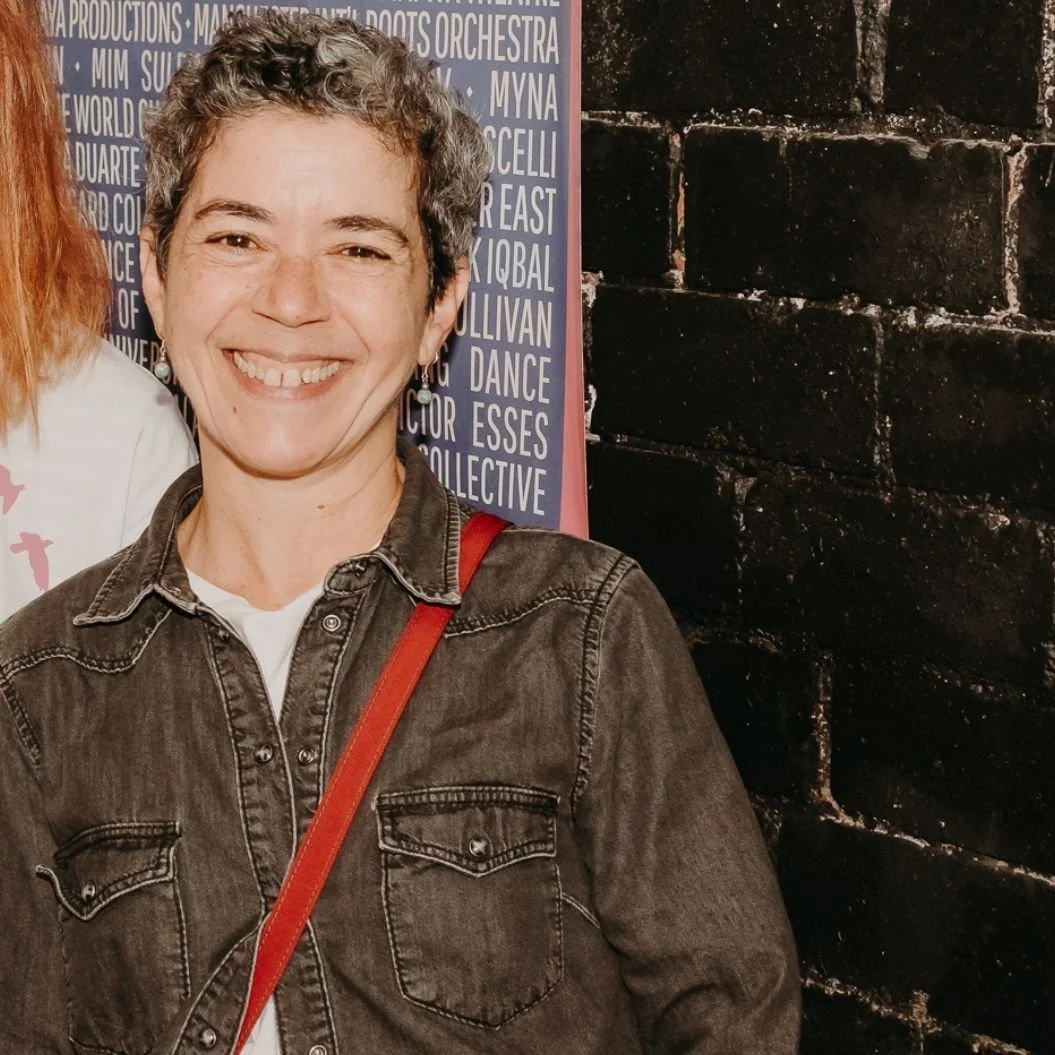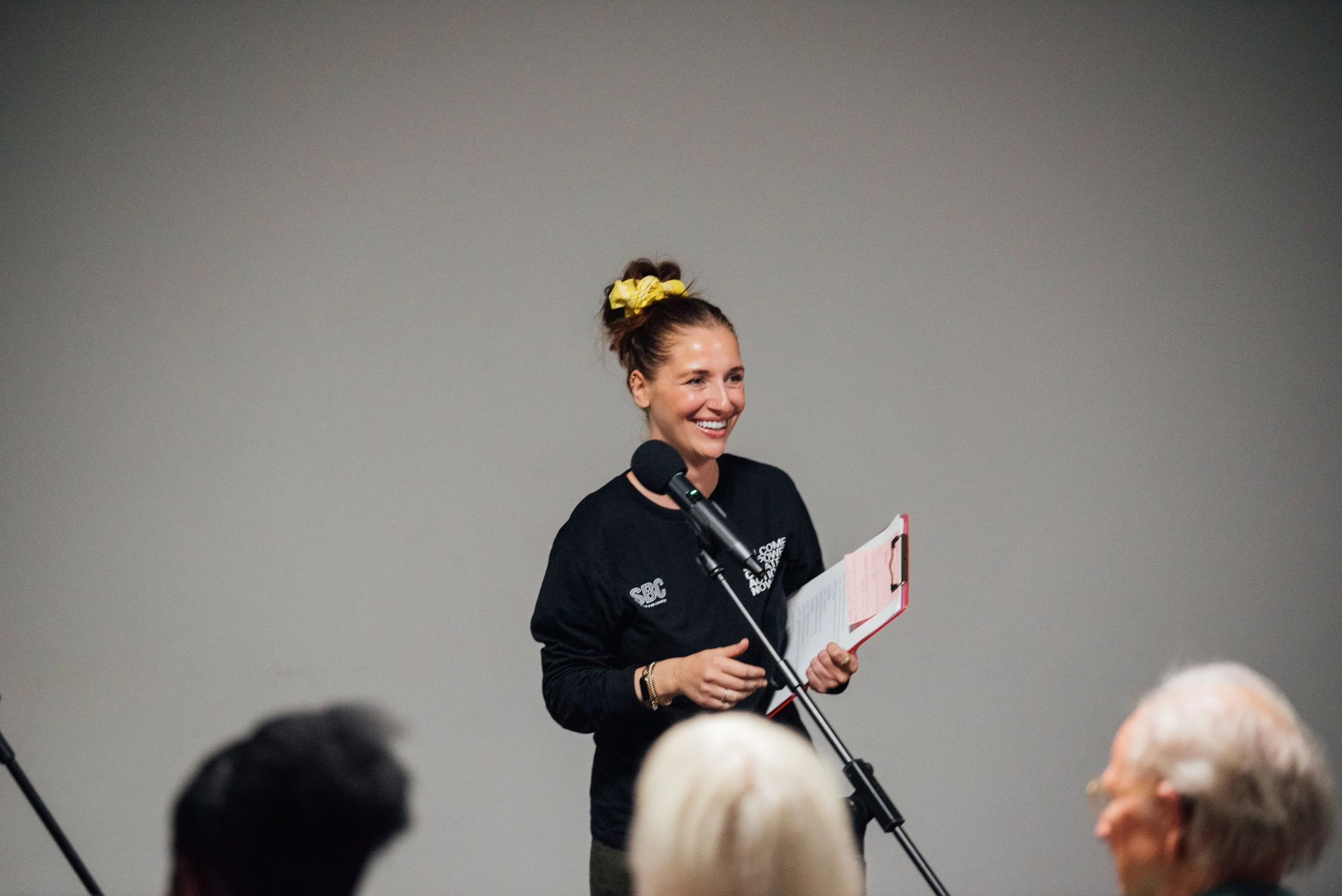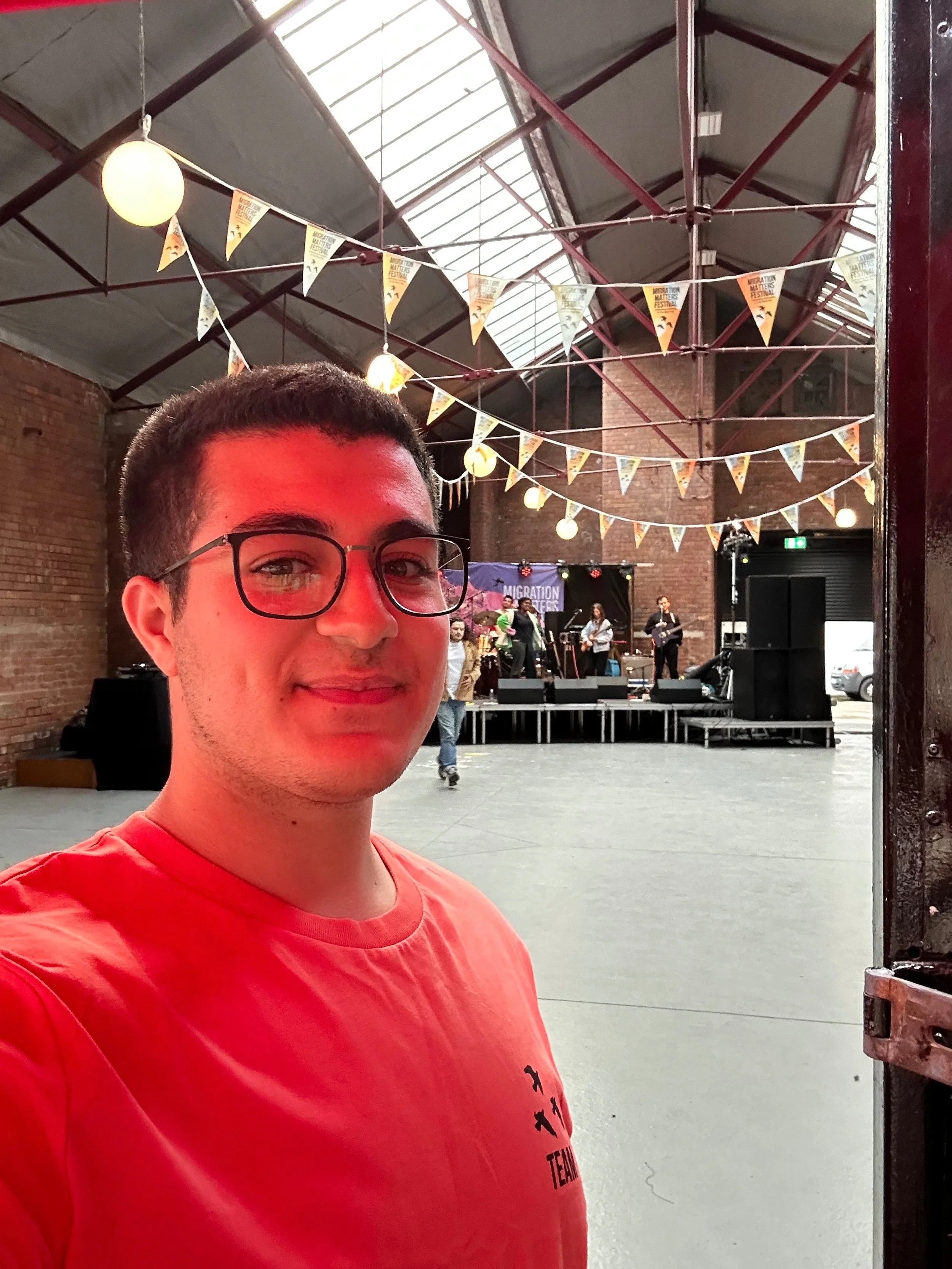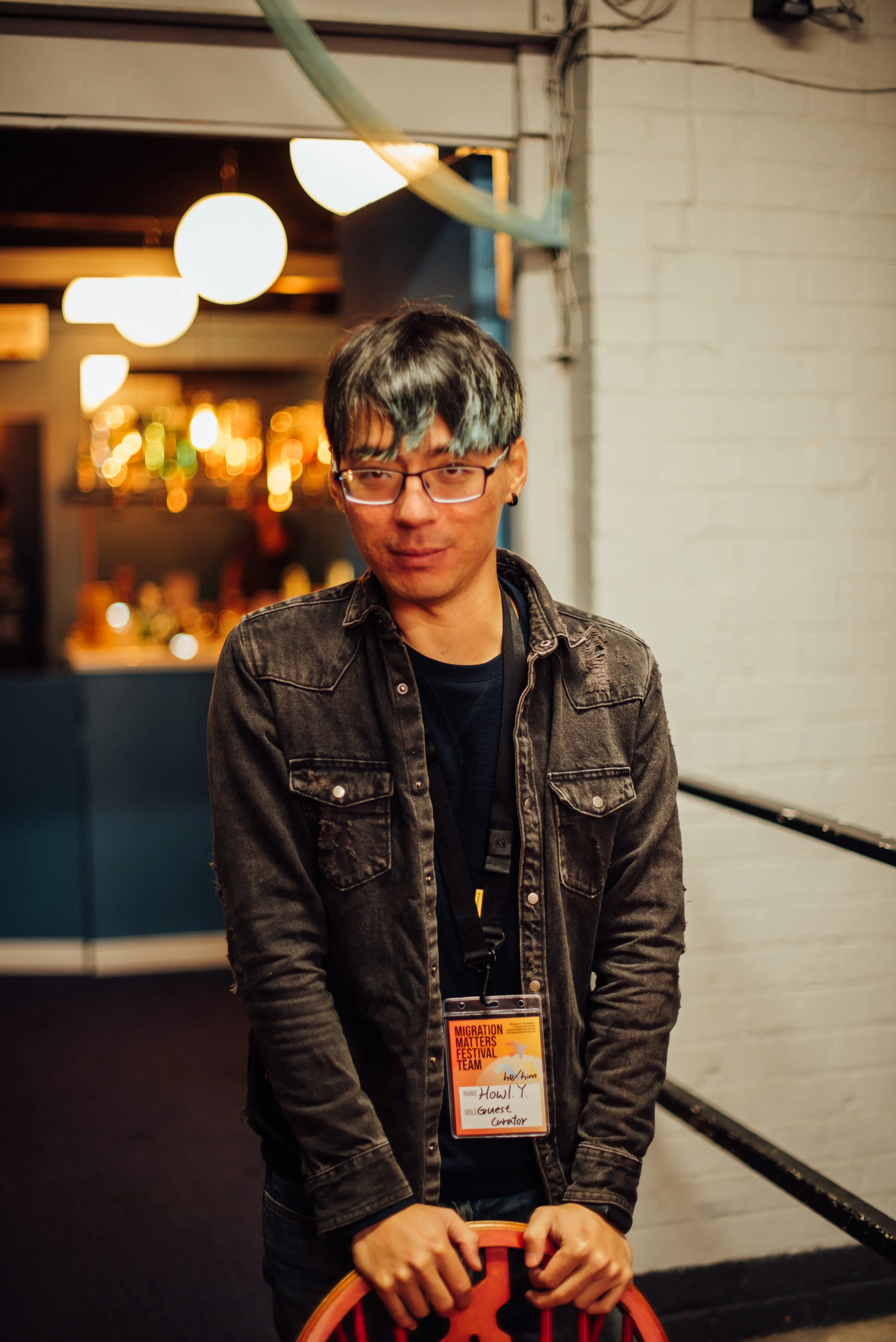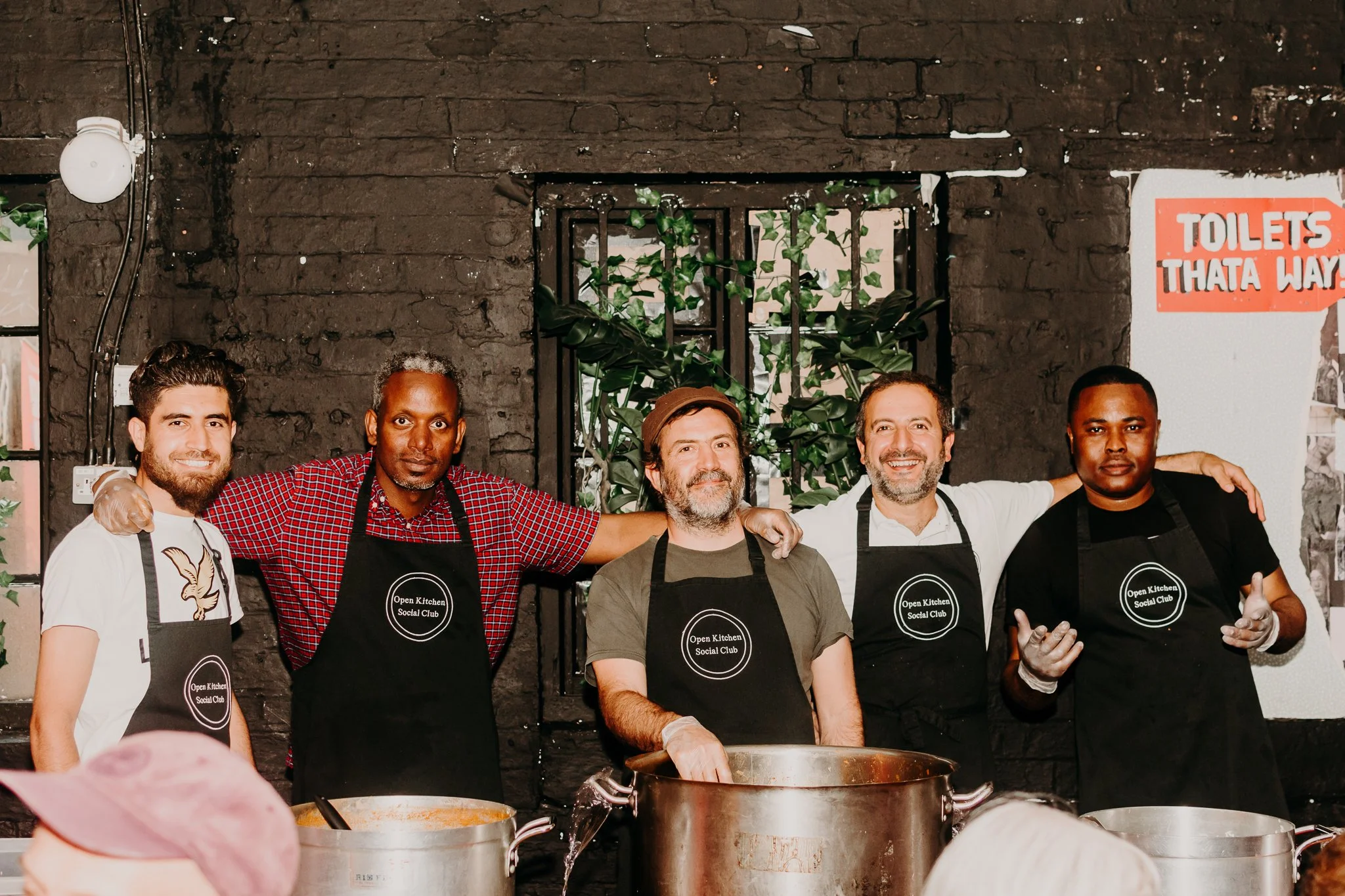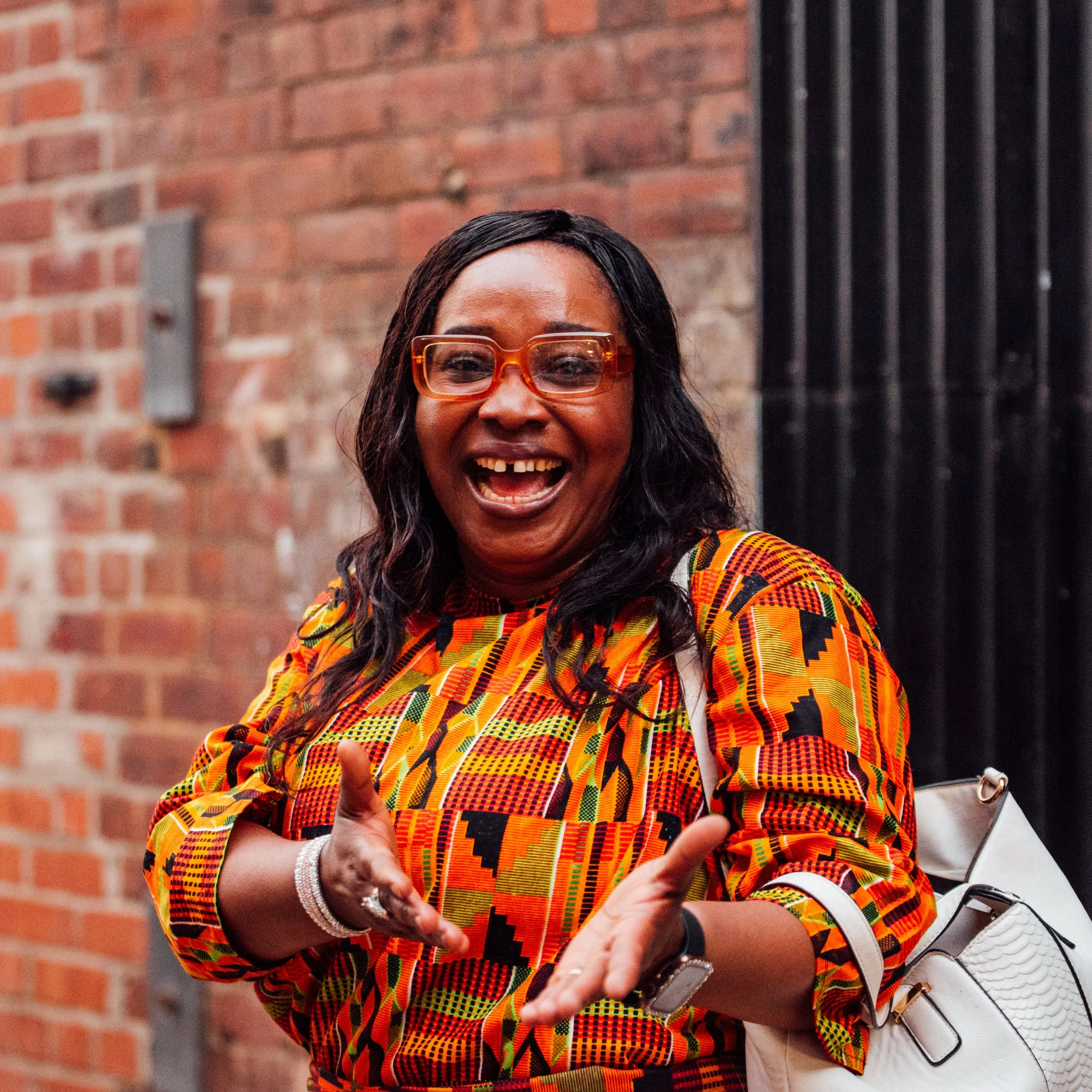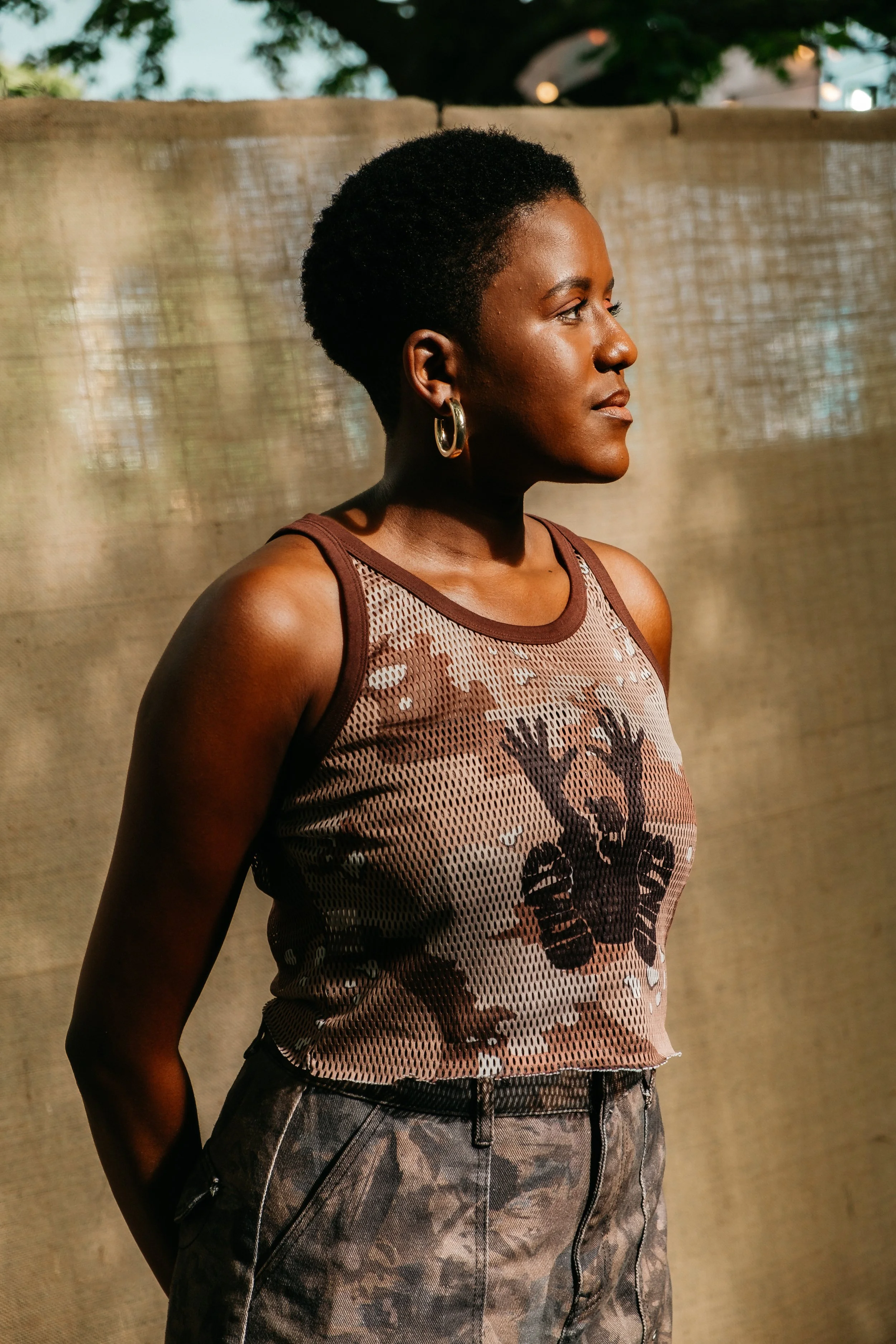‘Being in the festival makes me feel part of Sheffield’
Artists, volunteers, audience members and curators have shared their memories of the festival.
Over the last decade, tens of thousands of people have proudly celebrated sanctuary through our Sheffield festival.
We know audiences have included more than 85,000 people alone, and we’ve platformed over 1,000 artists from 163 countries around the world.
So to celebrate our tenth year, we asked a selection of people who have volunteered with, performed at or enjoyed the festival to share what it means to them.
And the results were - emotional!
Here are their reflections on our, and their, journey so far.
Ines Alfano loves learning about other people’s stories through the festival
1) Ines Alfano, volunteer and audience member
How did you first get involved with the Migration Matters Festival?
I went to see poet Linton Kwesi Johnson at the Abbeydale Picture House, which was the first time I heard of Migration Matters. I think this was in 2018. When I saw some people working at the event, I immediately felt that I’d like to do that too!
What impact did the festival have on you - both in the immediate and the long-term?
Being in the festival makes me feel part of Sheffield. I love learning about people’s stories and enjoying so many different expressions of art, history, knowledge and culture. And I feel it’s vital to get involved in something that’s about love and help make sure that this message is heard by as many people as possible.
Tell us about your highlights of the festival
I honestly don’t have any specific highlights – I simply love it all. I love working at and attending as many different events as I can and dancing the night away with everyone taking part in this beautiful celebration.
Why is the festival and its focus on celebrating sanctuary important for Sheffield and the world?
I believe that by creating a safe space for all people, we can show that living together isn’t only possible – it’s better. Migration Matters does this with joy, and I think this is a great way of strengthening a wonderful community.
What hopes do you have for the future of the festival?
To keep going strong and maybe sprinkle its joy at other times of the year too, making its presence felt and its voice heard more often.
Rosie MacPherson said co-creating the children’s strand of the festival, Mini Mig Mat, was a highlight.
2) Rosie MacPherson, artistic director at festival partner Stand & Be Counted Theatre
How did you first get involved with the Migration Matters Festival?
We were lucky enough to be involved in the very first year of MigMat! In 2015 we shared a work-in-progress of our production “Tanja”.
It was so exciting to be amongst artists and audiences that shared our values and passions and it was whilst making “Tanja” that we became the UK’s first Theatre Company of Sanctuary so Migration Matters has always been an important friend and collaborator.
What impact did the festival have on you - both in the immediate and the long-term?
We’re proud to say we have been a part of nine out of 10 festivals! From testing work, touring live and digital productions, running workshops and exhibitions, to partnering on Mini MigMat - this festival lets us fully showcase all the brilliant talents of our participants and artists and we love coming back year on year.
Tell us about your highlights of the festival
Creating MiniMigMat with the festival team and The Montgomery is very special to us, enabling our Youth Theatre of Sanctuary to curate their own festival for children and families and take ownership of what they and their peers would like to see and experience has had a profound impact on the young people we work with.
I feel so lucky to live in Sheffield and have this festival on my doorstep every year, it really is the best IN THE WORLD. Special shout-out to the closing parties.
Why is the festival and its focus on celebrating sanctuary important for Sheffield and the world?
MigMat perfectly encompasses the power of sanctuary, so many incredible people from all over the world bring this city to life with their creativity, generosity and brilliance. The joy in every room, the friendships and connections created every year this is what community truly is.
What hopes do you have for the future of the festival?
The UK needs this festival. I want to see them continue to grow and take audiences on even more adventures.
Putting this brilliant beast together takes a lot. I hope we can secure the future of MigMat and make sure the mega team behind it has all the time and resources needed to let it thrive.
Tom Rigby is part of a group which has performed every year of the festival
3) Tom Rigby, artist and facilitator at Side by Side
Name: Tom Rigby, facilitator at Side by Side
Festival role: Artist
How did you first get involved with the Migration Matters Festival?
We performed at the first festival and have performed every year since!
What impact did the festival have on you - both in the immediate and the long-term? At our first Migration Matters performance we hosted a new audience and met new people who wanted to be involved with our group.
In fact, some of our now longest-standing members first encountered us as audience members at that performance.
Tell us about your highlights of the festival
During the pandemic, we performed a virtual play for Migration Matters and our production included an original song with the lyrics ‘When I’m lost, when I’m weary, I know you’ll be there, Side by Side.”
This perfectly sums up our group as even at a time when we couldn’t be together, we hosted our sessions every week. This particular event included performers zooming in from four different countries!
Why is the festival and its focus on celebrating sanctuary important for Sheffield and the world?
To show the world that people seeking refuge make our country richer. Richer in spirit, community, art and so much more.
What hopes do you have for the future of the festival?
Striking a beautiful balance between growing and hosting larger acts and a larger audience, and retaining a strong connection to the community groups who benefit greatly from this wonderful festival.
Artist Lora Krasteva in Becoming British, 2024.
4) Lora Krasteva, artist and audience member
How did you first get involved with the Migration Matters Festival?
The festival programmed my exhibition, Becoming British, in 2022. We showcased work at Bloc Projects. In 2024 they also welcomed the performance piece that was developed on the basis of the exhibition and further research and development: a six-hour durational performance installation interrogating national identity from the perspective of first -generation migrants in the UK. We performed at Soft Ground in June 2024.
What impact did the festival have on you - both in the immediate and the long-term?
Migration Matters Festival believed in me as an artist. Together with Bloc they supported the idea and concept of Becoming British from the very start and gave me the platform and confidence to explore and grow the work.
Programming the durational performance, a type of theatre that is not often seen in the UK anymore, and by understanding how work grows and evolves they indicated that there is a home of this type of work and that they too believe it to be important.
Having such opportunities to share work in Sheffield are super valuable, especially for performance makers who don’t have much local infrastructure that can support their experimentation.
Tell us about your highlights of the festival
My highlight is always the opening party. I know a lot of people wax lyrical about the closing one but I am not good on goodbyes (and are often bone tired by then). I just love that moment where we can all come together, artists, audiences and staff and get some food and a good boogie and have aaaaall of the festival ahead of us.
Another personal highlight was when the security staff at the venue where we performed Becoming British said they had never seen something so moving and stayed a good while to watch it. Spontaneous, unsolicited feedback from people who didn’t even intend to come and see something is always magical.
Why is the festival and its focus on celebrating sanctuary important for Sheffield and the world?
Currently, the world loves to hate immigrants. We live in a time of division and manipulation so having spaces where we can gather to celebrate each other, to be in community and in joy are super important. The focus of the festival is a political act itself. It’s important to show, in the flesh, how we can not only be united but also happy and creative together.
What hopes do you have for the future of the festival?
I would love to see it take over some unusual spaces around the city like private homes or spaces that aren’t traditionally associated with migration but have a huge role to play in it (like the Town Hall where many have their citizenship ceremony for example).
I would love to see the festival having a more commissioning role, bringing artists and communities to create together.
It would also be amazing to see work at scale come to or be created in Sheffield and for everyone else to galvanize around Refugee Week so that it becomes a true Sheffield moment.
Volunteer Ayman Greba found the festival helped in adjusting to a new life.
5) Ayman Greba, festival volunteer
How did you first get involved with the Migration Matters Festival?
Through Voluntary Action Sheffield in 2024.
What impact did the festival have on you - both in the immediate and the long-term?
As I had only been in the UK for a few months, for the first time, the festival helped me to communicate with others and allowed me to feel more connected with the community.
Volunteering was the door that has made me more confident in my ability to adapt and learn more about my new life in Sheffield.
Tell us about your highlights of the festival
The highlight of the festival was the people. Without the great team and the artists who helped create the atmosphere of the festival so energetic, friendly, and most importantly, the sense of community.
Why is the festival and its focus on celebrating sanctuary important for Sheffield and the world?
It reminds people that everybody deserves safety and dignity with their backgrounds. The festival introduces challenges and stories and interweaves them together to create a beautiful testimony of strength in diversity and solidarity. It inspires and creates spaces for people to understand each other and enjoy their troubles to turn into friendship.
What hopes do you have for the future of the festival?
I hope more people are involved, especially local communities, organizations and young people to enjoy the festival.
I hope this would create a platform that allows visibility and connections to people’s backgrounds and dreams to come together and achieve dreams.
The more stories and music are shown the more inspiration and love blooms.
Howl Yuan, a former guest curator, launched his artistic career with Mig Mat.
6) Howl Cheng-Po Yuan, artist and former guest curator
How did you first get involved with the Migration Matters Festival?
I first became involved with the Migration Matters Festival in 2016, just after graduating as a migrant arts student. I was actively reaching out to venues and festivals to find opportunities, and Migration Matters was one of the few that responded.
They offered me a platform to showcase my work, which truly launched my creative career in the arts.
What impact did the festival have on you – both in the immediate and the long-term?
Migration Matters provided a supportive and welcoming space to present and develop my practice. It offered a unique opportunity to connect with other creatives from marginalised and underrepresented backgrounds, to reflect on urgent issues, find inspiration, and simply to co-exist.
Beyond my artistic contributions, the festival encouraged bold thinking. I proposed the idea of a guest curator scheme to bring more diverse perspectives into the programming and amplify collective voices. I was thrilled when the festival embraced this idea and allowed me to work with the team to develop it.
Tell us about your highlights of the festival.
My highlights are a mix of joyful and challenging moments. I remember a time when morale was low due to the rising anti-migrant, xenophobic political climate.
Sam, the festival director, reminded us: “It is more essential than ever that we stand together and talk to people.”
That moment clarified for me the importance of Migration Matters Festival.
It is not just an event—it's an amplifier for voices, a sanctuary, rather than an echo chamber.
Of course, the festival is also filled with joy and celebration.
Every night we danced, every time we gathered, every shared meal—all of these moments remain special to me.
Why is the festival and its focus on celebrating sanctuary important for Sheffield and the world?
As I touched on earlier, the festival reflects Sheffield’s spirit—its inclusivity, diversity, and willingness to learn and listen. Ironically, these are exactly the values we need more of in today’s world. Migration Matters doesn’t just respond to urgent issues; it represents hope and action.
What hopes do you have for the future of the festival?
I hope the Migration Matters Festival continues doing what it does best—celebrating sanctuary and supporting diverse voices.
I wish for it to receive the resources and backing it needs to grow and thrive, to build stronger connections with like-minded people and organisations, and to always find new ways to celebrate community and creativity.
The Open Kitchen Social Club team are known for the delicious food they serve up at key festival events.
7) Open Kitchen Social Club, festival caterer
How did you first get involved with the Migration Matters Festival?
By invitation from director Sam Holland, starting in 2016.
What impact did the festival have on you - both in the immediate and the long-term?
Migration Matters is hugely important in showcasing the ways in which sanctuary seekers can make a positive impact in Sheffield – and that includes our role in providing delicious food!
Contributing to the festival helped to make us known to a wider range of people, through which more have become involved over the years – joining in with our social café sessions, volunteering with us plus helping us raise much-needed funds, by choosing us to cater for their events too.
Tell us about your highlights of the festival
As well as enjoying feeding large numbers of festival goers, with great feedback, we loved being able to share event tickets with our members, through the free ticket access programme.
There have been some brilliant musicians and dancers as well as times to just let go of all troubles and dance along – as St Augustine says In Praise of Dancing, “it frees people from the heaviness of matter and binds the isolated to community.”
Why is the festival and its focus on celebrating sanctuary important for Sheffield and the world?
The festival’s focus on celebrating sanctuary provides a powerful counterweight to the fake accusations of those who seek to blame, harm and vilify people.
What hopes do you have for the future of the festival?
That the people who attend are not exclusively those who already support sanctuary seekers, that it draws in new people, willing to come with open minds to learn, share and experience more widely.
Rose Deline Bazzie says the festival ‘is a space of safety and belonging’
8) Rose Deline Bazzie, audience member and singer in Sheffield One World Choir
How did you first get involved with the Migration Matters Festival?
My husband, Akoi Bazzie, one of the founding members of the Sheffield One World Choir, invited me to the festival to see them sing at Theatre Deli in Sheffield. The experience touched me so much I decided to join the choir.
I was honoured to perform for the first time at the festival in 2024, transitioning from a listener to a voice in the Migration Matters Festival.
What impact did the festival have on you – both in the immediate and the long-term?
The festival created an immediate sense of belonging.
As a singer/artist, I felt I belonged to the choir with a desire to become a voice in the Migration Matters Festival.
I knew that in the long-term, I would feel more confident working within a diverse group of people including migrants to share our stories and struggles in ways that would bring healing, encouragement and happiness through music and art.
It would reassure me that my voice and the voices of migrants like me truly matter.
Tell us about your highlights of the festival:
The festival is a space of safety and belonging. A warm atmosphere of peace, welcome, diversity, and creativity. Personally, performing with the choir has been my greatest joys. Seeing people touched by our harmonies and messages reminded me of the power of unity and hospitality.
Why is the festival and its focus on celebrating sanctuary important for Sheffield and the world?
Sanctuary means more than shelter, it means welcome, dignity, and peace.
The festival amplifies this by celebrating the rich contributions of migrants and reminding society of our shared humanity. Especially in today’s world, it offers hope, challenges prejudice and builds bridges between communities.
What hopes do you have for the future of the festival?
I pray and hope that the festival continues to grow in visibility and inclusivity, offering more opportunities for new and established migrant artists to be seen and heard.
I would love to see it foster deeper collaboration between communities, especially involving young people and women with lived experience of migration.
Ghost and John are returning to the festival to showcase their work
9) Ghost and John, artists
How did you first get involved with the Migration Matters Festival?
In 2023, we brought our outdoor dance drama "Radio Neighbourhood" alongside Little Bean Theatre's "Boh Boh Finds Home" to the festival. We were invited by curator Howl Yuan.
It was a wonderful experience sharing sci-fi stories about migration with the lovely crowd.
What impact did the festival have on you - both in the immediate and the long-term?
The festival gave a great sense of community and pride. It has displayed diverse modes and methods to showcase how migration shaped this country and is an undeniable part of our social fabric.
Artists, audience and curators here formed a collective voice saying "the marginalised" has always been a central part of the British cultural scene.
Tell us about your highlights of the festival
In 2024, we showed our community paper sculpture and durational performance "Thousand Papers 千紙" at the festival.
Amongst the long white strips of paper and many origami structures, we made paper umbrellas with visitors, as well as writing letters that will never be read. We were told that the space was contemplative and offered a moment of peace.
Why is the festival and its focus on celebrating sanctuary important for Sheffield and the world?
We must be celebrating sanctuary as we are imagining a future where everyone gets to determine their own paths. It takes communities to keep everyone safe and free to express themselves.
The festival gives Sheffield and the world a demonstration of this reality when we choose liberation.
What hopes do you have for the future of the festival?
We simply hope festivals like this could go on forever.
Diyo Bopengo Jr, pictured right, would like the festival to go global.
10) Diyo Bopengo Jr, volunteer community ambassador and project assistant
How did you first get involved with the Migration Matters Festival?
I started volunteering with the festival in 2020 during lockdown, so it was a strange time to get started.
What impact did the festival have on you - both in the immediate and the long-term?
The festival provides the platform to be the best of myself, increasing social connection and learning different cultures.
Tell us about your highlights of the festival
Some of the Asian live musical performances, the opening and closing party and karaoke.
Why is the festival and its focus on celebrating sanctuary important for Sheffield and the world?
With the variety on Sheffield base culture, the festival connects every culture into one
What hopes do you have for the future of the festival?
For the festival to extend all around the United Kingdom and maybe globally.
Singer Rumbi Tauro performed with Sauti Sol and is now a 2025 guest curator.
11) Rumbi Tauro, guest curator 2025
How did you first get involved with the Migration Matters Festival?
In 2023, I was booked as the support slot for the incredible Sauti Sol.
We had the most incredible evening opening up for them at The Leadmill. This year I found the call-out for a 2025 guest curator and I just had to sign up.
What impact did the festival have on you - both in the immediate and the long-term?
MigMat allowed me to be connected to so many like-minded creatives within Yorkshire. It was such an incredible opportunity to find out more about the different communities that gather across the week to celebrate the festival and this has allowed me to feel a deeper sense of belonging within the North.
Tell us about your highlights of the festival
Being able to watch Sauti Sol perform before taking their hiatus. The evening of music was electric and it was an incredible show.
Why is the festival and its focus on celebrating sanctuary important for Sheffield and the world?
MigMat’s focus on sanctuary sends a powerful message at a time when displacement and migration are affecting millions. It highlights the shared responsibility we have to support those forced to flee their homes and showcases how welcoming communities can thrive.
By celebrating sanctuary, Sheffield sets an example for other cities around the world—showing that compassion and solidarity can lead to stronger, more vibrant societies.
What hopes do you have for the future of the festival?
Another successful 10+ years of uniting communities.
Long-serving volunteer Annie Mays enjoys the ambience of the festival each year.
12) Annie Mays, volunteer, guest curator, artist and audience member
How did you first get involved with the Migration Matters Festival?
I saw (director) Sam Holland in the early years of promoting MMF and I volunteered to distribute the programmes.
What impact did the festival have on you - both in the immediate and the long-term?
It felt like a mini world music festival with loads of music, dance, arts, stories, poetry, singing and all from various cultural backgrounds.
Even the audience dresses up in various colours and fashions.
From the start, it was very small, but over the years the festival grew bigger and bigger and with more worldwide and famous singers, bands and plays too.
There is more theatrical stuff and not forgetting the international food and cuisine always provided by Open Kitchen Social Club. Amazing food!
Tell us about your highlights of the festival
Last year’s highlight was certainly Amadou and Miriam.
The year before was Sauti Sol at The Leadmill and people came on coaches from Leeds, London, Birmingham and Manchester. It was sold out too.
Why is the festival and its focus on celebrating sanctuary important for Sheffield and the world?
To celebrate Refugee Week! It’s important to raise awareness so refugees, asylum seekers and migrants are made welcome here.
We are a very tolerant city and Sheffield is the first City of Sanctuary. Now Leeds, Manchester and other cities have followed suit.
Sheffield is now on the map in other countries and inviting musicians, singers and various bands from other countries made Sheffield more globally recognized and talked about.
What hopes do you have for the future of the festival?
It would be nice if it was a one-month festival instead of a week.


